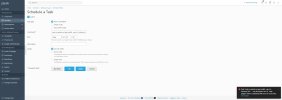@godfather21 I am assuming that the SSH user you are trying to run the command with is not added to wheel group and doesn't have sudo privileges. Note that if you take that path, you will also need to enable
NOPASSWD in order for that to work, which might be a security risk.
It might be better to consider configuring the task from Tools & Settings > Scheduled tasks in order to directly execute the command with the root user.
I tried also with the scheduled tasks as root in plesk panel admin i get that it's completed but when i try via ssh i get the following response
PHP Warning: Undefined array key 0; File: /usr/local/psa/admin/plib/modules/wp-toolkit/library/Capability/WpCli/LocalPleskLinux.php, Line: 17
PHP Warning: Undefined array key 0 in /usr/local/psa/admin/plib/modules/wp-toolkit/library/Capability/WpCli/LocalPleskLinux.php on line 17
PHP Warning: Undefined array key 0; File: /usr/local/psa/admin/plib/modules/wp-toolkit/library/Capability/WpCli/LocalPleskLinux.php, Line: 74
PHP Warning: Undefined array key 0 in /usr/local/psa/admin/plib/modules/wp-toolkit/library/Capability/WpCli/LocalPleskLinux.php on line 74
NAME
wp
DESCRIPTION
Manage WordPress through the command-line.
SYNOPSIS
wp <command>
SUBCOMMANDS
admin-username Manage administrator username.
cache Adds, removes, fetches, and flushes the WP Object Cache
object.
cap Adds, removes, and lists capabilities of a user role.
cli Reviews current WP-CLI info, checks for updates, or
views defined aliases.
comment Creates, updates, deletes, and moderates comments.
config Generates and reads the wp-config.php file.
config-settings Manage config settings command
core Downloads, installs, updates, and manages a WordPress
installation.
cron Tests, runs, and deletes WP-Cron events; manages WP-Cron
schedules.
db Performs basic database operations using credentials
stored in wp-config.php.
db-prefix Manage database prefix.
embed Inspects oEmbed providers, clears embed cache, and more.
eval Executes arbitrary PHP code.
eval-file Loads and executes a PHP file.
export Exports WordPress content to a WXR file.
help Gets help on WP-CLI, or on a specific command.
i18n Provides internationalization tools for WordPress
projects.
import Imports content from a given WXR file.
instance Make init
language Installs, activates, and manages language packs.
maintenance-mode Manage maintenance mode.
media Imports files as attachments, regenerates thumbnails, or
lists registered image sizes.
menu Lists, creates, assigns, and deletes the active theme's
navigation menus.
network Perform network-wide operations.
option Retrieves and sets site options, including plugin and
WordPress settings.
package Lists, installs, and removes WP-CLI packages.
pingbacks Manage config settings command
plugin Manages plugins, including installs, activations, and
updates.
post Manages posts, content, and meta.
post-type Retrieves details on the site's registered post types.
release Get release information
rewrite Lists or flushes the site's rewrite rules, updates the
permalink structure.
role Manages user roles, including creating new roles and
resetting to defaults.
scaffold Generates code for post types, taxonomies, plugins,
child themes, etc.
search-replace Searches/replaces strings in the database.
security-keys Manage WordPress config's security keys
server Launches PHP's built-in web server for a specific
WordPress installation.
shell Opens an interactive PHP console for running and testing
PHP code.
shortcode Manage shortcodes
sidebar Lists registered sidebars.
site Creates, deletes, empties, moderates, and lists one or
more sites on a multisite installation.
sitemap Manage sitemap
super-admin Lists, adds, or removes super admin users on a multisite
installation.
taxonomy Retrieves information about registered taxonomies.
term Manages taxonomy terms and term meta, with create,
delete, and list commands.
theme Manages themes, including installs, activations, and
updates.
transient Adds, gets, and deletes entries in the WordPress
Transient Cache.
user Manages users, along with their roles, capabilities, and
meta.
widget Manages widgets, including adding and moving them within
sidebars.
wpt-asset Extends for Plugin_Command \ Theme_Command
wpt-cron
GLOBAL PARAMETERS
--path=<path>
Path to the WordPress files.
--url=<url>
Pretend request came from given URL. In multisite, this argument is how
the target site is specified.
--ssh=[<scheme>:][<user>@]<host|container>[:<port>][<path>]
Perform operation against a remote server over SSH (or a container using
scheme of "docker", "docker-compose", "docker-compose-run", "vagrant").
--http=<http>
Perform operation against a remote WordPress installation over HTTP.
--user=<id|login|email>
Set the WordPress user.
--skip-plugins[=<plugins>]
Skip loading all plugins, or a comma-separated list of plugins. Note:
mu-plugins are still loaded.
--skip-themes[=<themes>]
Skip loading all themes, or a comma-separated list of themes.
--skip-packages
Skip loading all installed packages.
--require=<path>
Load PHP file before running the command (may be used more than once).
--exec=<php-code>
Execute PHP code before running the command (may be used more than once).
--context=<context>
Load WordPress in a given context.
--[no-]color
Whether to colorize the output.
--debug[=<group>]
Show all PHP errors and add verbosity to WP-CLI output. Built-in groups
include: bootstrap, commandfactory, and help.
--prompt[=<assoc>]
Prompt the user to enter values for all command arguments, or a subset
specified as comma-separated values.
--quiet
Suppress informational messages.
Run 'wp help <command>' to get more information on a specific command.

